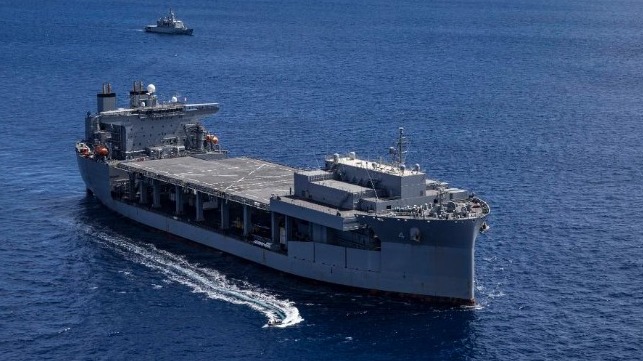
U.S. Navy expeditionary sea base USS Hershel “Woody” Williams is in West Africa where it is participating in maritime security training alongside Nigerian and Ghanaian maritime security authorities. The ship is scheduled to participate in a three-day sea training exercise with Nigerian offshore patrol vessels and members of Ghana’s Special Boat Squadron as part of efforts to contain the growing menace of piracy in the Gulf of Guinea. USS Hershel “Woody” Williams also becomes is the first warship permanently assigned to the U.S. Africa Command area of responsibility.
USS Hershel “Woody” Williams‘ return to the Gulf of Guinea builds upon exercise Obangame Express that continues to demonstrate U.S. commitment to African partnerships and ensures prosperity through maritime security and stability. Both Ghana and Nigeria were among the 32 nations that participated in Obangame Express 2021 that concluded in March and which was the largest multinational maritime exercise in western Africa region that has become the hotspot for piracy.
“Maritime security is not a one nation obligation. It takes cooperative efforts like this to achieve,” said Capt. Chad Graham, Hershel “Woody” Williams’ commanding officer.
The maritime security training exercise is focused on the collective capabilities for countering the trafficking of illegal arms and drugs, human trafficking, illegal migration, piracy and illegal fishing. The U.S. Navy said that it is participating in these ongoing efforts as part of the need to tackle illegal dealings. They consider the Gulf of Guinea’s security crucial to West Africa’s economic development, but note that it requires regional coastal countries to have strong, professional navies, coast guards and law enforcement institutions that can enable maritime trade to flourish.
“The Gulf of Guinea’s size requires a team effort. It takes multiple coastal nations working together for mutual benefit and that’s what we see,” noted Graham.
The Gulf of Guinea continues to be among the most dangerous environment for commercial maritime operations, a development that has ignited calls for international cooperation to address the menace. Last year, 112 seafarers were abducted in 90 incidents along the gulf. In the first five months of this year, 23 piracy-related incidents had already been reported in the region.
Apart from piracy, the region is witnessing rising cases of illegal fishing with reports indicating that West Africa loses roughly 800,000 tons of fish worth over $2 billion in gross revenue annually.
“Ship visits like this one clearly demonstrate the U.S.’s continued dedication to our partners in the Gulf of Guinea as they strive for security of their resources, their economy and their people,” said Claire Pierangelo, U.S. Consul General in Lagos.
The ship, 784 feet long, serves as a mobile sea platform capable of performing large-scale logistics movements, such as the transfer of vehicles and equipment from sea to shore. Homeported at a NATO naval base on the Greek island of Crete, it is designed to reduce the dependency on foreign ports.
SOURCE READ THE FULL ARTICLE
https://www.maritime-executive.com/article/us-navy-vessel-in-west-africa-for-anti-piracy-exercise